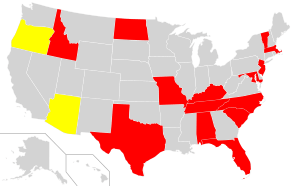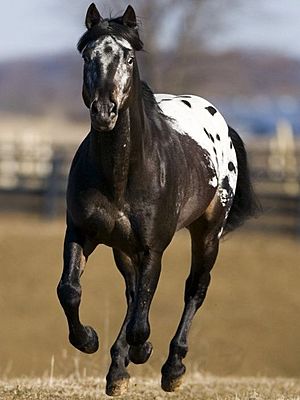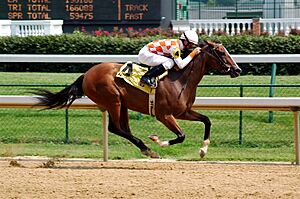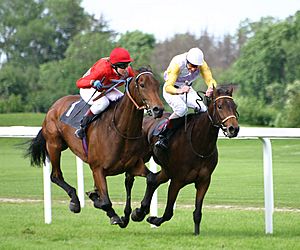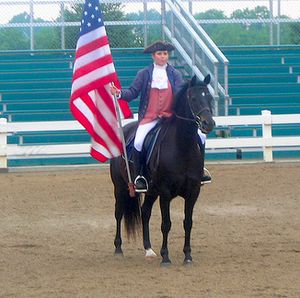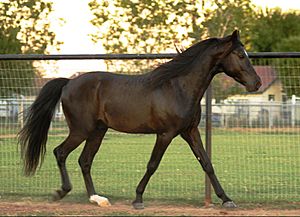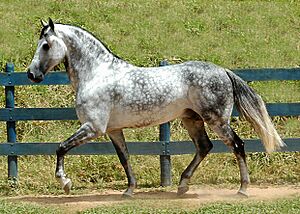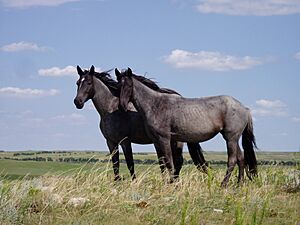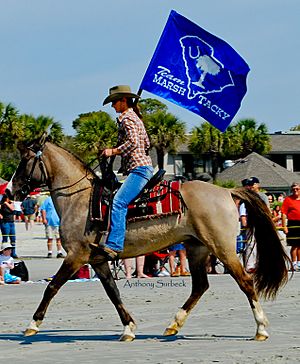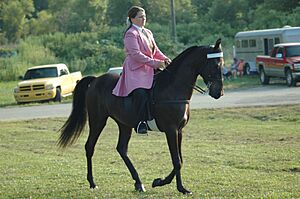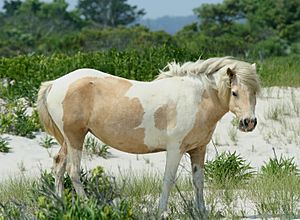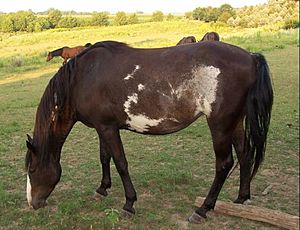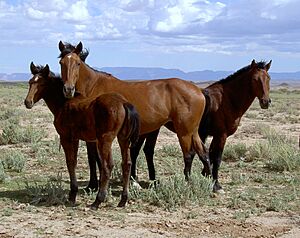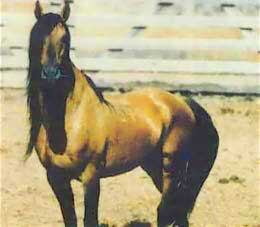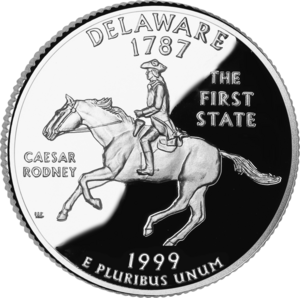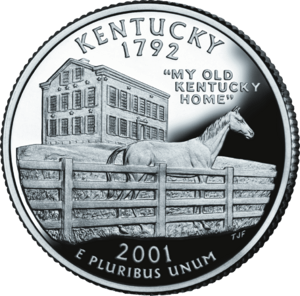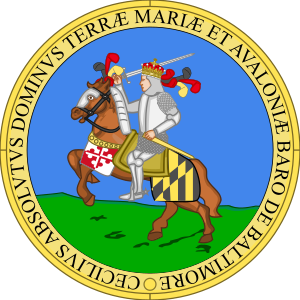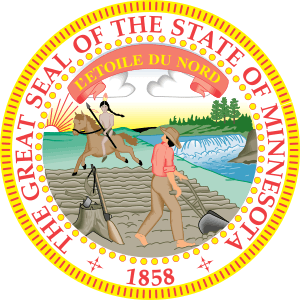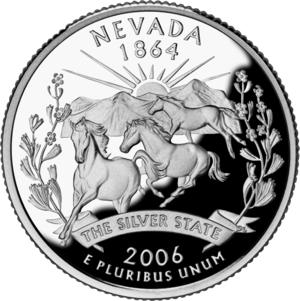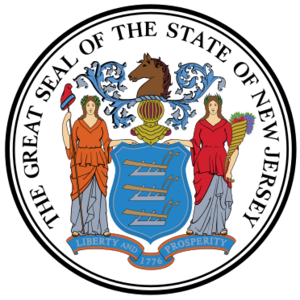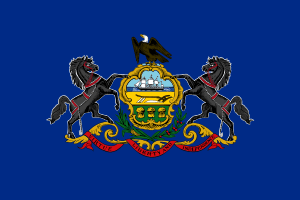List of U.S. state horses facts for kids
Did you know that many U.S. states have special symbols? These symbols often show what makes each state unique. Some states even have an official "state horse"! This means they have chosen a specific horse breed to represent them.
Currently, 12 states have a state horse breed. Two states have a horse breed as their "state animal." One state has an official "state pony." And one state has an "honorary state equine," which is another name for a horse.
The very first state horse was chosen in Vermont way back in 1961. More recently, in 2023, Virginia named the Chincoteague Pony as its state pony. In 2022, Oklahoma picked the American Quarter Horse as its state horse.
Some states, like Oregon and Arizona, have tried to choose a state horse, but it hasn't happened yet. For example, in Arizona, people wanted the Colonial Spanish Horse to be the state horse.
Why do states choose a specific horse? Sometimes, it's because the horse breed has a long history with the state. For example, the American Quarter Horse is important in Texas because of its history with ranching. The Morgan horse is special to Vermont and Massachusetts because it was developed there.
Other times, the horse breed's name even includes the state, like the Tennessee Walking Horse or the Missouri Fox Trotter. Sometimes, kids like you help make it happen! School children have worked hard to get horses like the Colonial Spanish Horse named the state horse of North Carolina. This breed is related to the Banker horses found in the Outer Banks.
State horses are just one type of state symbol. Every state has its own flag and state seal. Many also have official animals, plants, or even foods! These symbols usually connect to the state's history or culture. Horses also appear on other state symbols, like the horse's head on the seal of New Jersey.
Contents
Official State Horses and Equines
This table shows the different horse breeds that states have chosen as their official symbols.
| State | Breed | What makes it special? | Image | Year chosen |
|---|---|---|---|---|
| Alabama | Racking Horse | This horse is known for its smooth, special way of moving called an "ambling gait." Its main group is in Decatur, Alabama. | 1975 | |
| Florida | Florida Cracker Horse | Spanish explorers brought these horses to Florida in the 1500s. They helped a lot with farming and cattle in the state's early days. | 2008 | |
| Idaho | Appaloosa | The Appaloosa is very important to Idaho's history. It is strongly linked to the Nez Perce Native American tribe. | 1975 | |
| Kentucky | Thoroughbred | Kentucky is famous for its Thoroughbreds. There's a huge business around breeding and racing these horses here. | 1996 | |
| Maryland | Thoroughbred | Maryland has a long history of raising and racing Thoroughbreds. Today, it has many farms and racecourses for these horses. | 2003 | |
| Massachusetts | Morgan | The very first Morgan horse, named Figure, was born in West Springfield, Massachusetts in 1789. | 1970 | |
| Missouri | Missouri Fox Trotter | This horse breed is known for its special "fox trot" gait. It was developed in the Ozarks region of Missouri. | 2002 | |
| New Jersey | Horse (state animal) | New Jersey has many horse farms and horses. The horse industry helps protect natural lands in the state. | 1977 | |
| North Carolina | Colonial Spanish Mustang | This breed is connected to the Banker horses of the Outer Banks. These horses came from Spanish horses long ago. | 2010 | |
| North Dakota | Nokota (honorary equine) | Nokota horses live in the wild badlands of southwestern North Dakota. They are named after the Nakota Native American tribe. | 1993 | |
| Oklahoma | American Quarter Horse | Quarter Horses were ridden by cowboys, Native Americans, and pioneers who helped build Oklahoma. | 2022 | |
| South Carolina | Carolina Marsh Tacky | This horse breed grew up in the swampy Low Country region. It has been a big part of South Carolina's history. | 2010 | |
| Tennessee | Tennessee Walking Horse | The Tennessee Walker is a horse known for its smooth, special gaits. It was first developed in middle Tennessee. | 2000 | |
| Texas | American Quarter Horse | The Quarter Horse's story is closely tied to Texas. They were used for ranching and racing. The main group for this breed is in Amarillo, Texas. | 2009 | |
| Vermont | Morgan (state animal) | The Morgan breed was mostly developed in Vermont. The first horse of the breed, Figure, lived most of his life and died there in 1821. | 1961 | |
| Virginia | Chincoteague Pony (state pony) | The Chincoteague ponies live on Assateague Island. A volunteer fire company manages them. Even though they are called ponies, they look like horses. | 2023 |
Horses Proposed as State Symbols
Some states have tried to make a horse breed their official symbol, but it hasn't happened yet.
| State | Breed | What makes it special? | Image | Year proposed |
|---|---|---|---|---|
| Arizona | Colonial Spanish Horse | This horse has a long history in Arizona. A special group of them, called the Wilbur-Cruce strain, was first bred near Arivaca. | 2010 (proposed again in 2011) | |
| Nevada | Mustang | People in Nevada wanted the wild mustang to be the state horse. But this idea is still being discussed. | 2023 | |
| Oregon | Kiger Mustang | The Kiger Mustang is a type of wild horse found only in southeastern Oregon. | 2001 |
Horses in Other State Symbols
Horses are not just state animals; they also appear on other important state symbols!
| State | Symbol | Image | Date |
|---|---|---|---|
| Delaware | State quarter – Caesar Rodney on horseback | 1999 | |
| Idaho | License plate – Appaloosa | 2003 | |
| Kentucky | State quarter – Thoroughbred | 2001 | |
| Maryland | State Seal – Knight on horseback | 1969 | |
| Minnesota | State Seal – Native American on horseback | 1858, 1971, 1983, 1987 | |
| Nevada | State quarter – Mustang | 2006 | |
| New Jersey | State seal and coat of arms – Horse | 1928 | |
| Pennsylvania | Coat of arms and flag – Horses | Coat of arms: 1875 Flag: 1907 |
 | Ernest Everett Just |
 | Mary Jackson |
 | Emmett Chappelle |
 | Marie Maynard Daly |


